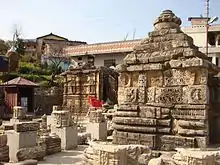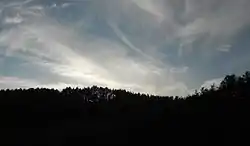Champawat district
Champawat district is a district of Uttarakhand state in northern India. The town of Champawat is the administrative headquarters. The district of Champawat constituted in the year 1997. The district is divided into five tehsils: Barakot, Lohaghat, Pati, Purnagiri, and Champawat. There is 2 Sub Tehsil: Pulla and Munch.[2] The largest and the main city of the district is Tanakpur.
Champawat district
Kali Kumaon | |
|---|---|
  .jpg.webp)   Clockwise from top-left: Baleshwar Temple, Tanakpur Dam, view of Champawat, Deodars at Banagun, view from Abbott Mount near Lohaghat | |
.svg.png.webp) Location in Uttarakhand | |
| Coordinates: 29.33°N 80.10°E | |
| Country | |
| State | Uttarakhand |
| Division | Kumaon |
| Headquarters | Champawat |
| Government | |
| • District collector | Narender Singh Bhandari IAS[1] |
| Area | |
| • Total | 1,765.78 km2 (681.77 sq mi) |
| Population | |
| • Total | 259,648 |
| • Density | 126/km2 (330/sq mi) |
| Languages | |
| • Official | Hindi |
| • Native | Kumaoni |
| Languages | |
| Time zone | UTC+05:30 (IST) |
| Vehicle registration | UK 03 |
| Website | champawat |
Champawat district is part of the eastern Kumaon division of Uttarakhand. It is bounded on the north by Pithoragarh district, on the east by Nepal, on the south by Udham Singh Nagar district, on the west by Nainital district, and on the northwest by Almora district.
As of 2011 it is the second least populous of the 13 districts of Uttarakhand, after Rudraprayag.[3]
Economy
In 2006 the Ministry of Panchayati Raj named Champawat one of the country's 250 most backward districts (out of a total of 640 districts).[4] It is one of the three districts in Uttarakhand currently receiving funds from the Backward Regions Grant Fund Programme (BRGF).[4]
Assembly Constituencies
- Lohaghat
- Champawat
Demographics
According to the 2011 census, Champawat district has a population of 259,648[3] roughly equal to the nation of Vanuatu.[5] This gives it a ranking of 579th among the 640 districts of India.[3] The district has a population density of 147 inhabitants per square kilometre (380/sq mi).[3] Its population growth rate over the decade 2001–2011 was 15.63%.[3] Champawat district has a sex ratio of 980 females for every 1000 males,[3] and a literacy rate of 79.83%. Scheduled Castes and Scheduled Tribes make up 18.25% and 0.52% of the population respectively.[3]
As of the 2001 Indian census, the Champawat district had a population of 224,542, including 216,646 Hindus (96.5%), 6,642 (3.0%) Muslims, and 626 (0.3%) Christians.[7]
The major spoken language by of the district is Kumaoni.[8]
| Champawat district: mother-tongue of population, according to the 2011 Indian Census.[8] | |||
|---|---|---|---|
| Mother tongue code | Mother tongue | People | Percentage |
| 002007 | Bengali | 519 | 0.2% |
| 006102 | Bhojpuri | 462 | 0.2% |
| 006195 | Garhwali | 561 | 0.2% |
| 006240 | Hindi | 50,254 | 19.4% |
| 006340 | Kumauni | 203,022 | 78.2% |
| 006439 | Pahari | 193 | 0.1% |
| 006489 | Rajasthani | 145 | 0.1% |
| 014011 | Nepali | 1,266 | 0.5% |
| 016038 | Punjabi | 378 | 0.1% |
| 022015 | Urdu | 1,474 | 0.6% |
| – | Others | 1,374 | 0.5% |
| Total | 259,648 | 100.0% | |
| Year | Pop. | ±% p.a. |
|---|---|---|
| 1901 | 39,902 | — |
| 1911 | 45,196 | +1.25% |
| 1921 | 44,606 | −0.13% |
| 1931 | 48,514 | +0.84% |
| 1941 | 56,462 | +1.53% |
| 1951 | 63,640 | +1.20% |
| 1961 | 83,080 | +2.70% |
| 1971 | 120,525 | +3.79% |
| 1981 | 151,072 | +2.28% |
| 1991 | 190,929 | +2.37% |
| 2001 | 224,542 | +1.63% |
| 2011 | 259,648 | +1.46% |
| source:[9] | ||
See also
- Jhirkuni. village in Barakot Tahsil
References
- "List Of Collectors | Champawat | India". Retrieved 4 July 2023.
- "Tehsil | Champawat | India".
- "District Census 2011". Census2011.co.in. 2011. Retrieved 30 September 2011.
- Ministry of Panchayati Raj (8 September 2009). "A Note on the Backward Regions Grant Fund Programme" (PDF). National Institute of Rural Development. Archived from the original (PDF) on 5 April 2012. Retrieved 27 September 2011.
- US Directorate of Intelligence. "Country Comparison:Population". Archived from the original on 13 June 2007. Retrieved 1 October 2011.
Vanuatu 224,564 July 2011 est.
- "Table C-01 Population by Religion: Uttarakhand". censusindia.gov.in. Registrar General and Census Commissioner of India. 2011.
- "Uttarakhand - Districts of India: Know India". National Portal of India. Archived from the original on 19 February 2009. Retrieved 4 April 2009.
- "Table C-16 Population by Mother Tongue: Uttarakhand". www.censusindia.gov.in. Registrar General and Census Commissioner of India.
- Decadal Variation In Population Since 1901